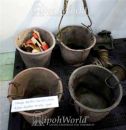We've tried to ensure the information displayed here is as accurate as possible. Should there be any inaccuracies, we would be grateful if you could let us know at info@ipohworld.org . All images and content are copyright.
(Please click on the thumbnail for a bigger image.)
Kinta Rubber Works Building




Kinta Rubber Works Ltd was founded in 1940, by E.A. Hodges, who patented conservancy buckets made of rubber to replace wooden buckets which tended to leak and steel buckets that rusted. Hodges, according to an article in The Straits Times, was well known in the Singapore shipping circles. A factory was set up in Lahat Road, Ipoh, to manufacture rubber buckets as well as other rubber products. The factory was bought by Yeoh Ghim Cheow, for 20,000 Straits Settlement dollars. Yeoh Ghim Cheow was a partner in the stock broking firm Botly and Company and the son of Yeoh Khuan Joo, the patriarch of the famous Yeoh family of Ipoh. P.K. Chan, who advised Yeoh Ghim Cheow on the purchase of the business, become manager of Kinta Rubber Works.
At the time the factory at No. 80, Lahat Road, Ipoh, had two units of roller mills with two rollers each. These were driven by 12 inches belts, which made a loud slapping noise when in operation. The main products were rubber buckets. These buckets were strong and could also used in tin mines to carry tin ore. Other customized products for the tin mining industry were also manufactured.
During the Japanese Occupation, the factory manufactured solid bicycle tyres. The tyres were formed by extrusion and cured in a steam vulcaniser and then cut to the size of the bicycle wheel before being joined at the ends. The tyres were supplied to the general public, while rubber compounds for retreads were supplied to the Japanese army. Accelerators were not available at the time and Yeoh Ghim Cheow used ash instead. Sulphur was plentiful, and was liberally added to the compounds, resulting in sulphur "blooms" on the products.
As the number of cars and motor vehicles on the road increased, the firm increased its production of compounds for retreaded tyres, initially supplying retreaders in Lahat Road, Ipoh. The Lahat road factory was found inadequate to meet the requirements of the expanding market, and a factory was rented in Sg. Pari in south Ipoh to set up mixing facilities. At the time, the business was managed by Yeoh Kian Hin, the eldest son of Yeoh Ghim Khoon ( later Dato ) and brother of Yeoh Ghim Cheow, who was responsible for successfully marketing retread compounds not only in Ipoh and Perak but all the way up to Singapore. Yeoh Kean Hin later become MD of Tasek Cement and handed over Kinta Rubber Works to Yeoh Kian Cheng.
In 1965, Yeoh Kean Cheng moved the factory to a six acre site at Tasek Industrial Estate. The factory expanded its product range, manufacturing rubber liners, jigs, pump liners, hoses, water stops and other products for the mining industry. The new factory at Tasek Industrial Estate was set up with three creping mills and Kinta Rubber Works become a manufacturer of rubber shoes. At the time there were over 200 workers at the Tasek factory site. In 1970s the product range included hand built rubber hoses, canvas shoes for the army as well as for school pupils, rubber sheeting for lining tin dredges ( with teams going to the dredges to install the rubber liners on site ), crash helmets, rubber bands, and civil engineering products like water stops which were used in dams and reservoirs in Malaysia and Singapore.
When the tin mining industry collapsed in the 1980's, the demand for rubber products for tin mining declined drastically. Investment into a braided hose plant and Banbury mixer at around the same time aggravated the problems faced by the company, futher compounded by issues with the workers union. The braided hose plant was a failure but the mixer saved the company as it attracted the attention of Bandag who bought compounds from Kinta Rubber for their pre-cured treads. A portion of the factory land was leased to Bandag to build a plant to produce pre-cured treads and cushion gum, and the company began to turn around. Yeoh Kean Cheng was prolific in designing compound formulations and was always keen on acquiring new equipment to expand the company's capabilities.
Yeoh Kean Cheng passed away in March 2012, after 55 years at the helm of Kinta Rubber Works, leaving the company in the hands of his three sons, Patrick Yeoh, Yeoh Lam Ewe and Yeoh Lam Swee.
Kinta Rubber now focuses on custom compounding and has added more mixing lines at a new plant at the Pengkalan 2 Industrial Estate in Pusing, Perak. Kinta Rubber Works can now produce over 1000 tons of compounds per month in wig-wag form, cut slabs, strips, calendered sheets and extruded profiles or built up as blanks. Calendered sheetings and large mouldings are expected to be the main products, to meet the new challanges in rubber industry.
Kinta Rubber Works has become a long way from its origins in 1940. During its heydays in the 1970's, it was a leading rubber products company, manufacturing a wide range of products and even considering listing on the stock exchange, before facing a downturn with the collapse of the tin industry in Malaysia. Today it is again poised for growth, with a new management team, new investment and vision for the future.
The photographs show the factory at Tasek Road (2), father and son, Yeoh Ghim Cheow and Yeoh Kean Cheng (in 1960) and the rubber buckets.